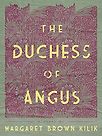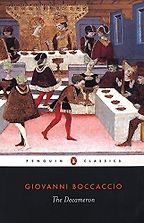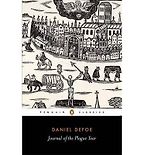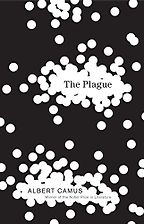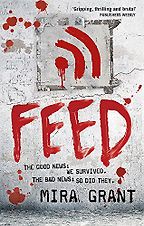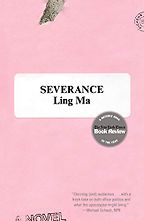Jenny Davidson, novelist and Ivy League literature professor, I’ve asked you to play a twisted version of Desert Island Discs. Our topic is books to read during quarantine: what were your criteria in coming up with this exciting list?
A few of these are classics in the literature of pestilence and a few are recent novels that brilliantly tap into current world situations and considerations. I couldn’t cover everything: for instance, one of the earliest and most influential descriptions of a plague comes in Thucydides’ History of the Peloponnesian War, when a devastating disease hits Athens in the 5th century BCE. But all of the books I’ve chosen are using the mode of storytelling to think not just about the human condition in times of illness, but about the human condition more generally. Illness in these works of fiction often also stands for any kind of extreme situation that pushes us to consider the fundamental conditions of human life and society.
Boccaccio’s The Decameron, set during the time of the plague we’ve since come to call the Black Death, seems like the right place to start.
Giovanni Boccaccio was inspired by the fact that he was writing in the wake of a major epidemic that hit Florence in the 14th century. The premise of the book is that a group of young noblemen and -women, people of great privilege who have been able to flee the plague-ridden city, are telling each other stories to while away their time together in the luxurious villa to which they’ve retreated. The description of the plague in the frame narrative is very vivid and quite horrifying; it sets a dark tone. But the stories that the characters tell each other are bawdy and humorous, with a carnivalesque feel. The Decameron captures the fact that the suspension of normal realities that happens in a tragic situation like a pandemic can, paradoxically, produce a special protected environment for storytelling and its appreciation.
What do we learn about the state of mind of the seven self-quarantined women from the frame story?
Sex is central to almost all of the stories in The Decameron. A lot of them involve playful scenarios. The one that I think of most often is a story where a lascivious monk tricks a young woman into having sex with him. She knows that sex is wrong, but the priest calls the activity that he asks her to do “putting the devil back in hell,” a wonderful euphemism for the act of penetrating her vagina with his penis. She dutifully assists him in the project, putting the devil back in hell whenever he asks. Pandemics seem to introduce into life and literature conditions of unusual license.
A Journal of the Plague Year, by novelist and journalist Daniel Defoe, is your next choice of quarantine books. I’ve read that the reason the phrase “bring out your dead” is embedded in historical consciousness (as memorialized by Monty Python) is because of this book. Tell us about it.
Defoe is better known as the author of novels like Robinson Crusoe and Moll Flanders. Here, there is an even thinner line between fact and fiction. When Defoe was writing in the 1720s, the novel was a new and emerging genre. Novelists were hungry for good material, so Defoe looked back sixty years to the bubonic plague that struck London around 1665, the year before the Great Fire of London. So A Journal of the Plague Year is a historical novel, and its pretext is that this narrative is a live journal of the epidemic by somebody living through it. The title page suggests that it’s been discovered in manuscript.
“The suspension of normal realities that happens in a tragic situation like a pandemic can, paradoxically, produce a special protected environment for storytelling and its appreciation.”
One of the most striking aspects of the book is that its storytelling mechanism incorporates early versions of the same kind of epidemiological data that we are paying attention to during the coronavirus outbreak. Bills of Mortality were the 17th century reporting method by which individual neighborhoods in London tallied up each week’s deaths and assigned them causes. Defoe incorporates those data to convey the arc of a disease on the rise, a disease which only relented after near total societal breakdown.
“A close conversing with death, or with diseases that threaten death, would scum off the gall from our tempers, remove the animosities among us and bring us to see with differing eyes than those which we looked on things before,” I was struck by this quote from A Journal of the Year of the Plague. Does it capture Defoe’s theme?
That’s not representative of the book as a whole. Both the narrator and Defoe are interested in the mob mentality which took hold during the disease and how often people behave badly once the ordinary conventions of human interaction are suspended. The novel presents a bleak scenario, with even drastic quarantine measures being ineffective, because people behave as though rules don’t apply to them. People persecute strangers who come to their community because they’re afraid that they’re disease carriers. It’s not a Pollyannaish picture.
We may all be feeling a need for some existentialism in our lives, so on to Camus. Tell me about The Plague.
Albert Camus’s The Plague probably remains the best-known novel on the topic of epidemic disease. It tells the story of those involved in an epidemic in a North African setting. It is very interested in the details about how quarantines are enforced and the role not just of the government, but of individuals who band together into groups to manage the epidemic.
Get the weekly Five Books newsletter
Published in 1947, shortly after World War Two, The Plague is, in some ways, primarily an allegory for the spread of fascism.
Physicians are quick to note clinical inaccuracies in The Plague. I know you are not recommending it as a teaching text for medical students, but does the book succeed on more than the allegorical level?
It works well both at the allegorical and the literal level. This book is very vivid in conveying what it feels like to be in a city hit by an epidemic and what it feels like to be in quarantine. It also conveys how important it is to retain our humanity and our sense of connection to others in times when so much is at stake.
Next let’s talk about Newsflesh, by Seanan McGuire, writing under the name of Mira Grant.
This is a whole series of books by one of the most popular writers in science fiction and fantasy working today. When the first book came out, I devoured it. The premise is that we’re in a near-future United States where two man-made viruses (the first a cure for the common cold, the second a cure for cancer), have combined to create a new virus that can spontaneously turn people into a version of the classic zombie that we know from apocalypse movies. The two main characters, a brother and sister, are part of a news team in a world in which people are very, very hesitant to come into contact. They’re reporting on a presidential campaign in which there is corruption and manipulation at the highest level, not least concerning the virus. It’s a very good and very vivid page-turner.
How do the novelist’s interest in virology and modern media shape the story?
The science fictional premise is exceptionally well-rendered, and so is the worldbuilding around living in a time when contact is dangerous. In the world of Newsflesh, precautions are extreme, and every time you venture outdoors you must do a blood test when you return, shower in bleach and so forth. Communication is almost entirely virtual.
Five Books interviews are expensive to produce. If you're enjoying this interview, please support us by donating a small amount.
The intersection between the media, politics and contemporary society is definitely in the author’s crosshairs. We could say that about all of these books: in any situation of epidemic, we have to really pay attention to how we get our news. The quality of the information we’re getting affects our lives in a much more immediate way than it would normally; it becomes a matter of life or death.
Lastly, Ling Ma’s first novel about a fictional fungal virus. Tell us about Severance and why it’s a book to read in quarantine.
Severance deservedly got a lot of attention when it came out in 2018. It’s a brilliant book, the one on this list that I most strongly recommend to people trying to take their mind off the news. It takes the issues that the Newsflesh books also consider and politicizes them in a different way. It is about the intersection of immigration and global capitalism in modern cities and the breakdown of human communication and meaningful human contacts that occur as a consequence.
Are you sure it’s safe to recommend dystopian fiction in dystopic times?
Golden age mysteries and other classics of escapist fiction are another route, but even the best escapist fiction deals with weighty issues. I hope that these books might suspend, for a little while, some of the anxiety we feel while following moment-by-moment news of disasters in the media. Personally I find that entrance into the world of immersive fiction itself offers pleasure and relief from stress, even if the novel’s content is dark or dystopian.
Interview by Eve Gerber
March 16, 2020. Updated: January 10, 2021
Five Books aims to keep its book recommendations and interviews up to date. If you are the interviewee and would like to update your choice of books (or even just what you say about them) please email us at [email protected]

